


Table of Contents
- Introduction
- What Are Dedicated Freight Corridors
- Construction Progress & Challenges
- Technological Advancements
- Impact of Dedicated Freight Corridors in India
- Why Is a Dedicated Freight Corridor Needed?
- Conclusion
- Faq's
Introduction
Dedicated Freight Corridors (DFCs) in India represent a paradigm shift in the country's freight transportation infrastructure. Operated by the Dedicated Freight Corridor Corporation of India Limited (DFCCIL), these corridors are purpose-built railway lines designed exclusively for freight trains, enhancing the efficiency and speed of freight movement across the nation.
India's growing economy heavily depends on efficient logistics and transportation. To address congestion on existing railway networks and improve freight movement, the government launched Dedicated Freight Corridors (DFCs). These specialized rail networks are designed exclusively for freight trains, ensuring faster, cost-effective, and reliable goods transportation. The Eastern and Western DFCs are already reshaping India's supply chain by reducing delays, increasing freight capacity, and cutting logistics costs. This article explores what DFCs are, why they are needed, and their impact on India's economy, environment, and trade sector.
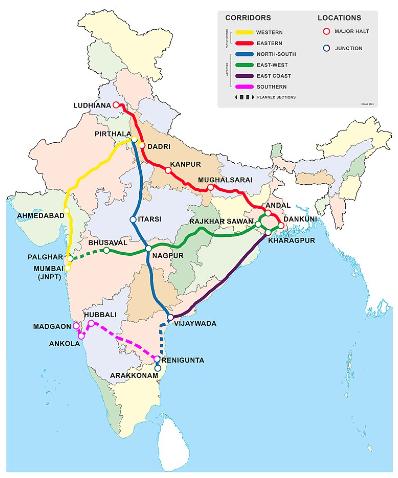 Dedicated Freight Corridors in India
Dedicated Freight Corridors in India
What Are Dedicated Freight Corridors
The inception of DFCs dates back to the Tenth Five Year Plan (2002-07), which highlighted the need for dedicated freight routes to accommodate the projected growth in freight traffic. Recognizing this necessity, the Indian government proposed building DFCs along key routes, leading to the establishment of the Eastern and Western Dedicated Freight Corridors.
Dedicated Freight Corridors (DFCs) are high-capacity railway corridors built exclusively for freight transport, ensuring seamless and efficient cargo movement across India.
Key Features of DFCs:
- Separate Tracks for Freight Trains - No interference with passenger trains.
- Higher Speeds & Capacity - Freight trains can run at 70-100 kmph (compared to 25-30 kmph on mixed-use tracks).
- Electrified & Automated Operations - Enhancing efficiency and reducing carbon footprint.
- Double-Stack Container Trains - Enabling higher cargo capacity per trip.
- Connectivity to Ports & Industrial Hubs - Streamlining import/export logistics.
Major Dedicated Freight Corridors in India
- Western DFC (Dadri to JNPT) - Facilitates EXIM (export-import) trade through ports.
- Eastern DFC (Ludhiana to Dankuni) - Boosts coal, steel, and agricultural goods transport.
- Future DFCs:
- East-West DFC
- North-South DFC
- South-West DFC
- Southern DFC
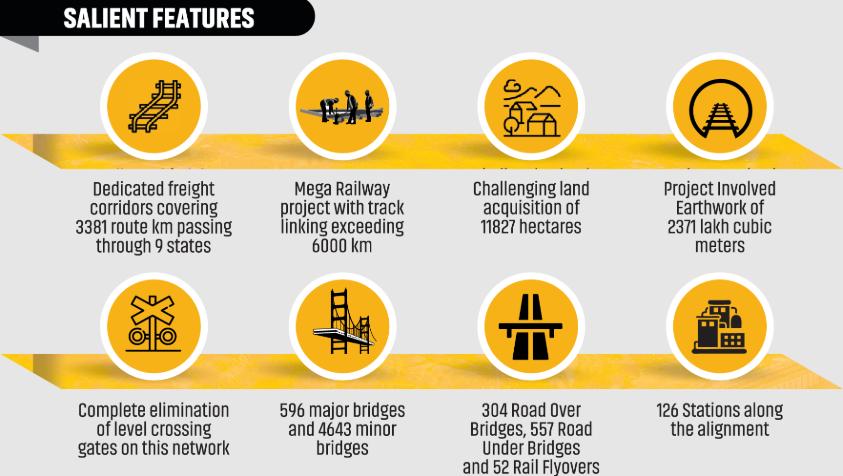
Construction Progress & Challenges
Under the Eleventh Five Year Plan (2007-12), construction commenced on the Eastern and Western Dedicated Freight Corridors, spanning a total length of 3,260 kilometers. As of April 2024, the Eastern Freight Corridor has been fully operational, while the Western Freight Corridor is 85% complete, with an overall network operational rate of 90%.
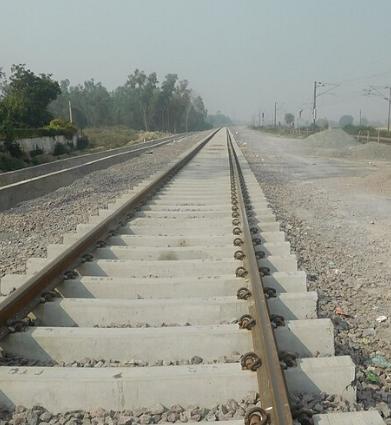 Under Construction Corridor
Under Construction Corridor
Challenges in Implementing DFCs
While DFCs bring multiple benefits, some challenges exist:
- Land acquisition delays impacting project timelines.
- High initial investment costs for rail infrastructure.
- Integration with existing railway networks for smooth cargo transition.
Despite these hurdles, the government and Dedicated Freight Corridor Corporation of India Ltd. (DFCCIL) are working towards faster implementation
Technological Advancements
DFCCIL has implemented cutting-edge technologies to enhance the efficiency and safety of freight transportation. High-rise pantographs, developed specifically for DFCs, enable trains to collect current more effectively, while advanced locomotives like the WAG-12 and WAG-9HH deliver unprecedented power and performance. Additionally, special track features, such as head-hardened rails and increased axle loads, ensure smooth and reliable operations.
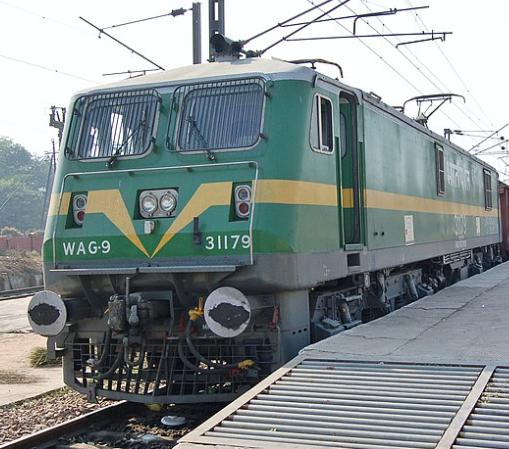 WAG-9HH
WAG-9HH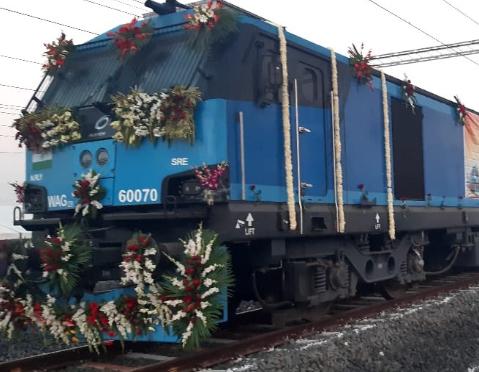 WAG-12
WAG-12
Impact of Dedicated Freight Corridors in India
1. Economic Growth & Industrial Development
- Faster goods movement enhances supply chain efficiency.
- Lower logistics costs make Indian exports more competitive.
- Increased investment in infrastructure and manufacturing sectors.
2. Boost to Logistics & Trade
- DFCs reduce freight transit time by 50%, improving trade efficiency.
- Seamless connectivity between ports, industrial zones, and markets.
- Enhanced transport for bulk commodities like coal, steel, and cement.
3. Environmental Benefits
- Electrification reduces diesel consumption and carbon emissions.
- DFCs reduce road congestion, cutting air pollution.
- Lower fuel costs contribute to sustainable logistics.
4. Job Creation & Economic Opportunities
- Large-scale infrastructure projects generate employment.
- Growth in logistics, warehousing, and manufacturing sectors.
- Increased revenue for Indian Railways through higher freight capacity.
5. Reduced Dependence on Roads
- Heavy freight movement shifts from highways to rail, reducing road damage.
- Lower fuel consumption and transportation costs for businesses.
- Safer & more reliable freight transport, minimizing accident risks.
Why Is a Dedicated Freight Corridor Needed?
DFCCIL continues to expand its network, with upcoming projects such as the North-South and East-Coast Freight Corridors poised to further enhance connectivity and efficiency. With a combined project value of Rs.2 lakh crore, these initiatives underscore India's commitment to modernizing its logistics infrastructure and driving future prosperity.
India's railway network is among the busiest in the world, but over 70% of its capacity is occupied by passenger trains. Freight trains suffer from delays, slow speeds, and high costs. DFCs solve these problems by:
- Reducing congestion on mixed-use railway lines.
- Enhancing logistics efficiency for industries like steel, cement, coal, and FMCG.
- Lowering transportation costs and boosting trade competitiveness.
- Supporting economic growth by connecting manufacturing hubs to ports.
- Decreasing road traffic & pollution by shifting freight from highways to rail.
Conclusion
Dedicated Freight Corridors (DFCs) are a game-changer for India's logistics sector. By reducing freight transit time, cutting logistics costs, and boosting industrial growth, they are reshaping India's economy. The shift from road to rail also reduces pollution and fuel dependency, making DFCs a sustainable solution for the future. As India continues investing in modern rail infrastructure, DFCs will play a crucial role in strengthening global trade and supply chain efficiency.
explore further
Latest from Location Reviews
More from Recommendations
Resources
Dwello, for every home buyer, is a way to go from 'I feel' to 'I know', at no extra cost.


